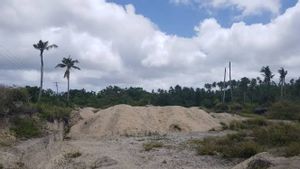JAKARTA - The Center of Economic and Law Studies (Celios) revealed that the sea sand export policy implemented by the government has the potential to reduce public income to IDR 1.21 trillion. Meanwhile, gross domestic product (GDP) will be eroded by IDR 1.22 trillion.
The government's decision to loosen sea sand exports is regulated through Government Regulation Number 26 of 2023 and Decree of the Minister of Marine Affairs and Fisheries Number 16 of 2024.
BELIOS' Director of Economics, Nailul Huda, said that the study conducted by CelIOS shows that although sea sand exports are expected to provide benefits for entrepreneurs and state revenues, the potential benefits for the country are relatively small.
"The simulations carried out found a negative impact on Gross Domestic Product (GDP) of Rp1.22 trillion, and public income will decrease to Rp1.21 trillion," he said in an official statement, Wednesday, October 2.
"So this study responds to various government claims that sea sand exports will increase the country's economic benefits and income. The claim turned out to be excessive," he continued.
Meanwhile, continued Huda, the state's estimated income only increased by Rp170 billion if calculating the indirect impact on the business field sector as a whole.
Although sea sand export entrepreneurs make a profit of IDR 502 billion, there are losses experienced by entrepreneurs in the fisheries sector.
CelIOS' economic MOdelling validates that the narrative of marine sand mining will encourage significantly inaccurate state exports and revenues. State revenue from taxes is unable to cover the overall loss of economic output which is at risk of falling by Rp1.13 trillion, "said Huda.
Huda said the study also showed that any increase in sea sand exports risks reducing capture fisheries production. As a result of sea sand exports of 2.7 million m3, there is a decrease in the gross added value of the fisheries sector which is estimated at IDR 1.59 trillion.
"It is estimated that fishermen's lost income is Rp. 990 billion and reduced employment opportunities in the fisheries sector by 36,400 people," he said.
Meanwhile, the Executive Director of CelIOS Bhima Yudhistira explained that sea sand exports actually risk creating unemployment in coastal areas. The model of sea sand mining using a suction ship and barge transportation also tends to be capital-intensive (capital intensive) is not labor-intensive.
SEE ALSO:
"There is no correlation between sea sand exports and quality and competitive economic growth," said Bhima.
Furthermore, Bhima said marine sand mining causes degradation of marine ecosystems that have an impact on capture fisheries. Coastal communities, especially fishermen, are in danger of losing their livelihoods due to the decline in fish catch.
"Previous historical data from 2001 to 2009 also showed negative correlations between increased sea sand exports and capture fisheries production," he said.
In addition, Bhima said sea sand mining also had an impact on damage to marine habitats that were difficult to repair in the long term.
Indonesia will lose the potential of Blue Carbon and the blue economy ecosystem if sea sand exploitation is continued. In fact, it is estimated that Indonesia has the potential to have 17 percent of blue carbon from the total world, equivalent to 3.4 Giga tons. This is in line with the future government's target of optimizing carbon loans of 65 billion US dollars or Rp994.5 trillion," said Bhima.
The English, Chinese, Japanese, Arabic, and French versions are automatically generated by the AI. So there may still be inaccuracies in translating, please always see Indonesian as our main language. (system supported by DigitalSiber.id)
















